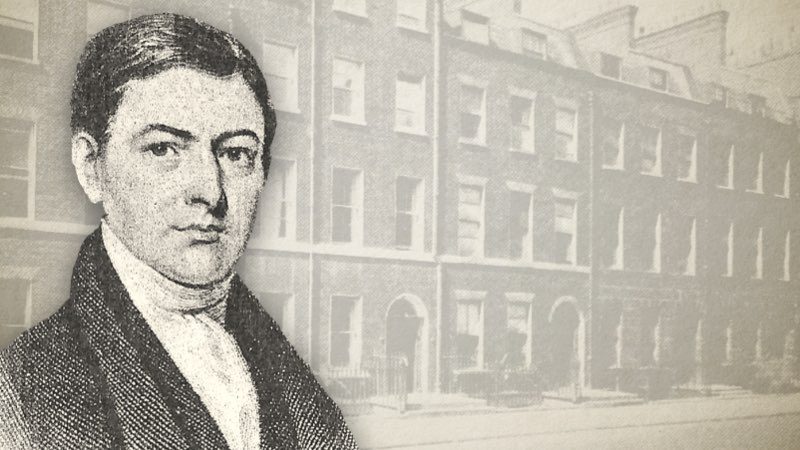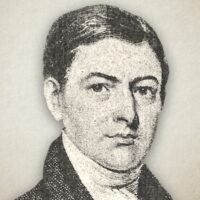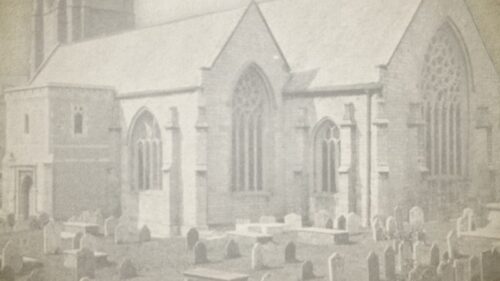
The Manna, And Its Spiritual Signification
“And the children of Israel did eat manna forty years, until they came to a land inhabited; they did eat manna until they came unto the borders of the land of Canaan.”—Exodus 16:35.
The history of Israel is a wonderful history, in which the attentive reader cannot but observe the sad depravity of human nature, and the great and astonishing patience of God. But we should never lose sight of this one thing—that God was determined to glorify His name in them; and this determination ran through all His dealings with them, and was the foundation of all His gracious acts towards them. Israel had not left Egypt two months before they began to murmur and rebel, and the Lord, to stop their murmuring, gave them a promise: “Behold, I will rain bread from heaven for you” (Exodus 16:4). And the Lord did so; and when the children of Israel saw it, they said, “It is manna,” or, “What is this?” or, “It is a portion.”
They lived on it near forty years, and it supported them, though they often loathed it. “Man hu” or “manna” was the name the people gave it, but the name the Lord gave it was, “bread from heaven.” From this we may learn that God must explain His blessings, or, such is the sinner’s ignorance, he will either question them, or call them by a wrong name. Poor sinners, quickened by the Spirit, often mistake and question the reality of their comforts, and are often heard to say, “What is it? It is a portion that seems to revive and strengthen me, but does it come from heaven?’’ Israel “wist not what it was;” and in a certain stage of many a quickened sinner, he knows not what judgment to make of that which passes in his mind; yet he lives, and is miraculously supported from day to day; is kept from despair and from going back into the world with the ungodly; but it is the “bread from heaven” that supports him.
The manna was not the true bread, but may be considered a type of it. The Jews with whom the Saviour conversed (John 6) looked no higher than Moses, and demanded of Christ a sign to prove His authority and truth of His doctrine: “What sign showest Thou then, that we may see, and believe Thee?” But Christ directed them to look higher than Moses, even to the Father, the Giver of the manna, and Giver of Himself, the true “bread from heaven,” saying, “For the bread of God is He which cometh down from heaven, and giveth life unto the world: I am the bread of life: he that cometh to Me shall never hunger, and he that believeth on Me shall never thirst” (John 6:33, 35).
And Christ repeats the same things to the same persons, who were blind to the spiritual mysteries of His kingdom, and they “strove amongst themselves, saying, How can this Man give us His flesh to eat?’’ They were puzzled, and said, “This is a hard saying: who can hear it?’’ The mystery of Christ’s person as Mediator is a stumbling-block to all natural men. No men manifest so much ignorance and malice against Christ as those who closely apply their intellectual powers to investigate this profound mystery. This grand and most sublime doctrine, “Immanuel, God with us,” the Holy Ghost alone can teach a man. The man of the finest natural endowments, of the most exalted powers of mind, of the deepest mathematical research, has no preeminence. The plain rustic, and the polished scholar, must sit alike at the feet of Christ to learn who and what He is. Oh, the folly, the presumption of men who attempt to teach religion as they teach the sciences, which vile practice has produced hundreds of preachers in this kingdom as ignorant of Christ as they were at the moment they were born into this world. Hence arises that jargon of confusion with which the Press teems and the pulpit rings—sounds as harsh and discordant to the ear of a spiritual man at the braying of the ass to the person who has a fine ear for music.
The manna was sent from heaven; so was Christ, the true and heavenly bread, the unspeakable gift of the Father, given to redeem lost sinners, who deserved nothing at His hands but indignation and wrath to the uttermost. That the Mediator might be qualified to take away our sin, He was clothed with our nature, and it was so ordered in the everlasting covenant: “A body hast Thou prepared Me.” In His human nature He sustained the tremendous load of His people’s sins, and made a complete atonement. Nothing can be added to it, and nothing can be taken from it. This complete atonement, received in the heart by faith, is the spiritual food by which we live, for Christ says, “He that eateth Me, even he shall live by Me.” This is the life that Paul lived, as he says, “The life I now live in the flesh, I live by the faith of the Son of God, who loved me, and gave Himself for me” (Gal. 2:20).
The manna was to be gathered fresh every morning by Israel, except on the Sabbath; and every one gathered according to his necessities. He that gathered much had nothing over, and he that gathered little had no lack. Thus they had their daily portion, and on the sixth day they gathered sufficient for the seventh. Christ is needed every day by poor, sensible sinners, and the poorer the wretch, the more welcome he is to Him. Did they go out to gather manna every morning? So must we, as it were, go out of ourselves, and repair to Christ only, who is the bread of God, to feed us. He that gathers most has nothing over, nothing to lay up in store, nothing to boast of; for what has he that he has not received? He that gathers little has enough for his need, and may go and gather more at the appointed time, and that is every day. “Behold, now is the accepted time; behold, now is the day of salvation” (2 Cor. 6:2).
The manna fell on the ground, so that they must needs stoop, if not fall on their knees, to gather it up. This may teach us that our place is to bow down with due submission. It is our interest so to do; it was theirs. There is no merit either in bowing or receiving, for no man can submit to be saved, and with cordiality embrace salvation by grace, until made willing in the day of God’s power. Almighty grace humbles proud sinners, and makes them put their mouth in the dust, if so be there may be hope; makes them confess, with the leper, “Unclean! unclean!” (Lev. 13:45}; and cry as the publican, “God be merciful to me a sinner” (Luke 18:13). Such poor sinners gather up heavenly manna, and find it most delicious fare. Israel fed on the manna while they abode in the wilderness, until they entered the Promised Land, and there was no failure of the manna, notwithstanding the frequent rebellion and perversity of the people. How astonishing that God should bear with their manners in the wilderness! As the manna did not fail them all their journey through, so spiritual Israel is supported, and sometimes most blessedly fed, with the bread of life, with the Word of God’s rich grace, and with hidden manna, even with communion with God. By these things we are encouraged all our journey through, and are preserved, looking towards the promised land of rest.
We may also observe how the Lord spreads a table for His people in the wilderness. How often is the goodness of God made known to His children in a way of providence, as in His providing bread from heaven! How often does He fulfil His promise, both literally and spiritually, “Bread shall be given him; his waters shall be sure” (Isa. 33:16).
“Feed me, Lord, with heavenly manna,
While I tread the wilderness;
Spread o’er me Thy glorious banner,
In each hour of deep distress;
Then with pleasure,
Thy dear name I’ll ever bless.”
Henry Fowler (1779-1838) was an Independent sovereign grace preacher and hymn writer. In 1813, he assumed responsibility for a gospel work in Birmingham. He removed to London in 1819, serving as pastor of Gower Street Chapel. The original congregation met in a chapel on Conway Street, and were followers of William Hintington’s ministry. Upon Mr. Fowler’s acceptance of the call to serve as pastor, a new chapel was built on Gower Street. This chapel (now demolished) was the predecessor to the old Gower Street Memorial chapel on Shaftesbury Avenue.





